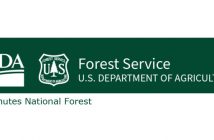(Owl Nest Box Workshop | Courtesy of Think Wild)
Local Wildlife Hospital and Conservation Center, Think Wild, has tips for Central Oregon residents to make their backyards wildlife friendly. Through native plant gardening, implementing water features and rock piles, and installing nesting boxes and feeders, residents can create living landscapes to nurture and support wild animals and their native habitat.
As summer approaches and area residents look for ways to improve their gardens, Think Wild suggests keeping wildlife in mind when designing lawn and garden improvements.
Restoring native plant habitat helps to protect Central Oregon’s biodiversity. Native plants provide food and shelter for wildlife, are easy to maintain, conserve water, and come in a variety of bright colors. The planting of native wildflowers helps to support essential pollinators such as bees, birds, bats, butterflies and beetles. One example is milkweed, which is a critical food source for migrating monarch butterflies. Unfortunately, milkweeds and other nectar sources are declining due to development and the widespread use of herbicides. Native plants are available for purchase in Bend through Winter Creek Restoration & Nursery, Great Basin Nursery and Clearwater Native Plant Nursery.
Always check for nests and baby animals when disturbing wood, leaf or rock piles. It is also ideal to try to delay major tree trimming until the fall or winter to allow wildlife like birds and squirrels to nest and raise their young undisturbed. Keep in mind that it is illegal to move a nest belonging to a federally protected bird — which includes all migratory species.
The addition of water features and rock piles can provide critical habitat to provide shelter and hydration. If installing a pond, make sure the water is regularly circulated to prevent algae growth and use rocks or sloping sides to make sure animals can exit if they fall in. Bird baths are easy, inexpensive ways to attract songbirds — just make sure to change the water regularly.
Nest boxes provide shelter and increased nesting options for songbirds, mammals and raptors. In fact, nesting boxes for owls and kestrels are excellent ways to promote natural “pest control” on your property, especially if you have mice and rats. The Natural Resources Conservation Service (NCRS) provides excellent guides on making nest boxes according to the desired species, or you can purchase a pre-made box from Think Wild.
It is critical to keep your cats indoors, especially in the Spring and Summer, for the safety of your cat and wildlife. Think Wild receives calls daily about cat-caught baby animals, which can often be lethal due to the bacteria in a cat’s saliva. You also don’t want your beloved pet to encounter a raccoon or other potentially dangerous animal.
Finally, if your property has barbed wire or other potentially hazardous fencing to wildlife, give Think Wild a call. Deschutes County Juvenile Community Justice will remove and dispose of the fencing at no cost!
If you ever have any questions, Think Wild’s wildlife hotline, 541-241-8680, is available seven days a week from 8am to 5pm.



